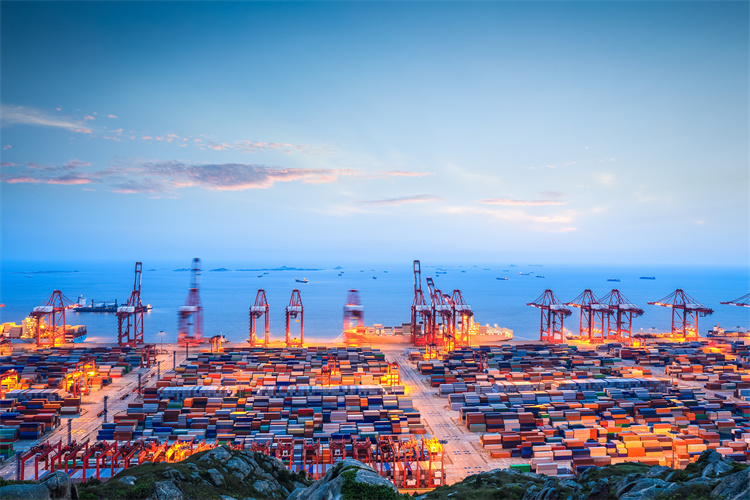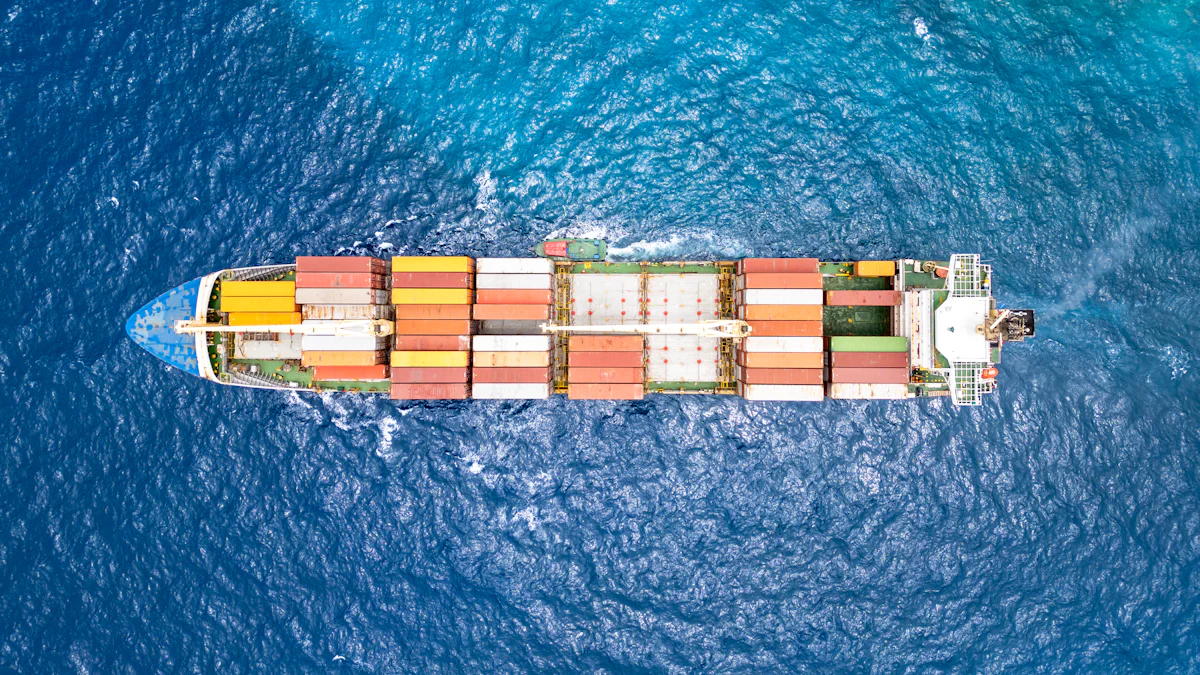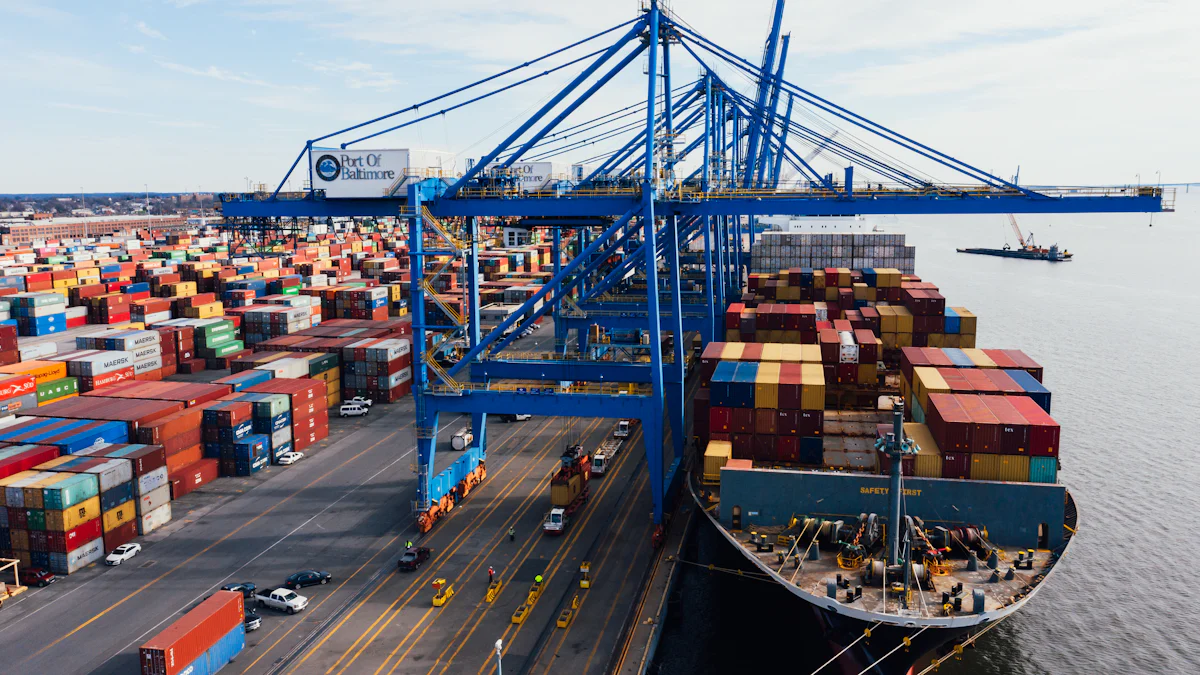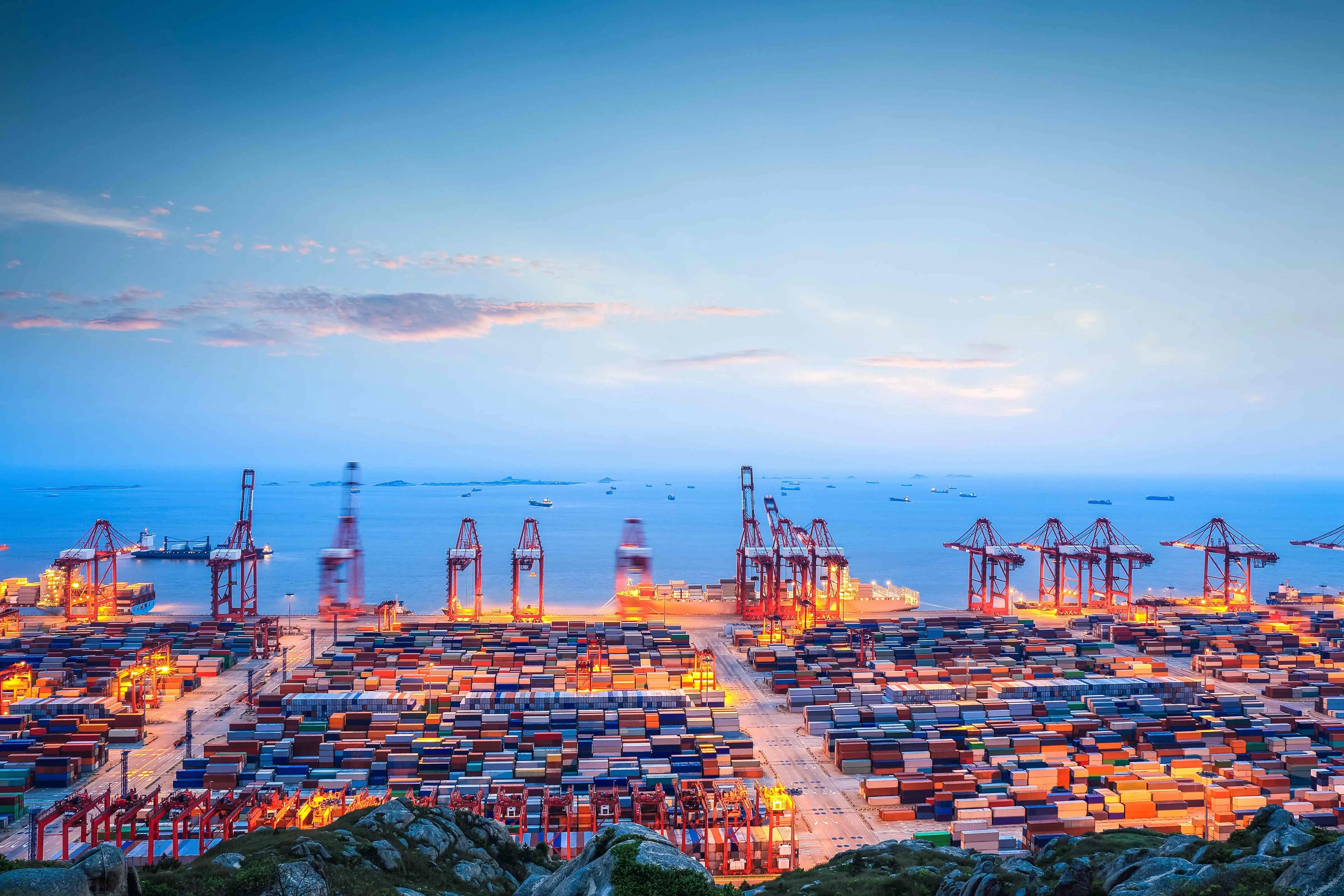Pros and Cons of Ocean Freight Transportation

Ocean freight transportation plays a crucial role in global trade, moving about 90% of the world's cargo. This method connects economies across continents, making it an essential part of international commerce. You might wonder about the benefits and drawbacks of using ocean freight. On the plus side, it offers a cost-effective solution for transporting large volumes of goods. Additionally, it has a lower carbon footprint compared to air and land transport. However, slower transit times and potential risks like weather-related delays can pose challenges. Understanding these aspects helps you make informed decisions in logistics planning.
Key Takeaways
Ocean freight is a cost-effective solution for transporting large volumes of goods, often significantly cheaper than air freight.
This method supports environmental sustainability with a lower carbon footprint per ton-mile compared to other transport modes.
Ocean freight offers unmatched capacity and flexibility, accommodating a wide range of cargo types, including oversized items.
While slower transit times can impact supply chain planning, careful scheduling can mitigate potential delays.
JUSDA provides comprehensive logistics solutions that streamline ocean freight operations, enhancing efficiency and reliability.
Utilizing JUSDA's JusLink platform allows for real-time tracking and intelligent risk management, improving supply chain resilience.
Understanding both the advantages and disadvantages of ocean freight helps businesses make informed logistics decisions.
Understanding Ocean Freight Transportation

Definition and Overview
Ocean freight transportation involves the movement of goods across the world's oceans using large cargo ships. This method serves as a backbone for international trade, facilitating the exchange of goods between countries. You can think of it as a vast network of shipping routes that connect ports globally. These routes allow for the efficient transport of bulk goods, ranging from raw materials to finished products. The process typically involves loading goods into containers, which are then placed on ships for their journey across the sea. Once the ship reaches its destination port, the containers are unloaded and transported to their final destinations.
Key Players in Ocean Freight, including JUSDA
Several key players operate within the ocean freight industry, each contributing to the seamless movement of goods. Shipping lines, freight forwarders, and logistics companies play crucial roles. Among these, JUSDA stands out as a significant player. With nearly 20 years of experience in lean supply chain management, JUSDA offers comprehensive logistics solutions. The company operates globally, providing end-to-end supply chain services. JUSDA's partnership with Foxconn Technology Group enhances its capabilities, particularly in regions like India, where it offers multi-modal services and operates warehouse hubs.
JUSDA's extensive network and innovative solutions make it a reliable partner in ocean freight transportation. The company has established a bonded warehouse in Vietnam to support electronic customers, showcasing its commitment to serving diverse industries. By leveraging its global presence, JUSDA ensures efficient and reliable freight services, contributing to the overall effectiveness of ocean freight transportation.
Advantages of Ocean Freight

Cost-effectiveness
Ocean freight transportation offers a significant advantage in terms of cost-effectiveness. You will find that shipping goods by sea is generally much cheaper than air freight. This cost efficiency becomes particularly evident when transporting large quantities of goods.
Lower transportation costs compared to air freight: Ocean freight is often the most economical choice for moving large volumes of cargo. Air freight can be up to five times more expensive for the same shipment size. This makes ocean freight a preferred option for businesses looking to minimize transportation expenses.
Economies of scale for large shipments: When you ship large quantities, ocean freight allows you to benefit from economies of scale. The larger the shipment, the lower the cost per unit, making it an ideal solution for bulk goods. This advantage helps businesses manage their logistics budgets more effectively.
Capacity and Flexibility
Ocean freight transportation provides unmatched capacity and flexibility, accommodating a wide range of cargo types.
Ability to transport large volumes: You can rely on ocean freight to handle massive shipments. Cargo ships are designed to carry large volumes, making them suitable for transporting everything from raw materials to finished products. This capacity ensures that businesses can meet their supply chain demands efficiently.
Variety of cargo types accommodated: Ocean freight can transport a diverse array of goods, including oversized and heavy items that might be restricted in air freight. This flexibility allows you to ship various cargo types, from electronics to machinery, without worrying about size or weight limitations.
Environmental Benefits
Choosing ocean freight transportation also supports environmental sustainability.
Lower carbon footprint per ton-mile: Ocean freight produces significantly lower emissions compared to air freight. By opting for sea transport, you contribute to reducing the carbon footprint associated with global trade. This makes ocean freight an environmentally friendly choice for businesses committed to sustainability.
Sustainable shipping practices: Many shipping companies are adopting sustainable practices, such as using cleaner fuels and optimizing routes to reduce emissions further. These efforts align with global initiatives to promote greener logistics solutions, making ocean freight a responsible choice for environmentally conscious businesses.
Enhanced Security
Security against theft and pilferage
Ocean freight transportation offers a robust level of security, which is crucial for safeguarding your goods. Shipping containers provide a secure environment, reducing the risk of theft and pilferage during transit. These containers are designed to withstand harsh conditions at sea, ensuring that your cargo remains protected throughout its journey.
Secure Containers: The use of standardized shipping containers plays a significant role in enhancing security. These containers are sealed and locked, making unauthorized access difficult. This feature provides peace of mind, knowing that your goods are less vulnerable to theft compared to other modes of transport.
Advanced Tracking Systems: Many shipping companies employ advanced tracking systems to monitor the movement of cargo. These systems allow you to track your shipment in real-time, providing updates on its location and status. This transparency helps in identifying any potential security breaches promptly.
Port Security Measures: Ports around the world implement stringent security measures to protect cargo. These measures include surveillance cameras, security personnel, and access control systems. Such precautions ensure that your goods are safe from unauthorized access while at the port.
Insurance Options: Ocean freight offers comprehensive insurance options to cover potential losses due to theft or damage. This coverage provides an additional layer of security, allowing you to recover financial losses if any unforeseen incidents occur.
By choosing ocean freight, you benefit from a transportation method that prioritizes the security of your goods. The combination of secure containers, advanced tracking, and robust port security measures makes ocean freight a reliable choice for transporting valuable cargo.
Disadvantages of Ocean Freight
While ocean freight transportation offers numerous benefits, it also comes with certain drawbacks that you should consider.
Slower Transit Times
Longer delivery schedules: Ocean freight transportation typically involves longer delivery times compared to air freight. Ships travel at a slower pace, which means your goods may take weeks to reach their destination. This extended timeline can affect businesses that require quick turnaround times for their products.
Impact on supply chain planning: The longer transit times necessitate careful planning in your supply chain operations. You must account for these delays when scheduling shipments to ensure that inventory levels remain adequate. This planning becomes crucial to avoid stockouts or overstocking, which can impact your business's efficiency and customer satisfaction.
Potential Risks
Weather-related delays: Ocean freight is susceptible to weather conditions. Storms, hurricanes, and rough seas can delay shipments, causing disruptions in your supply chain. These natural elements are unpredictable, making it essential for you to have contingency plans in place.
Risk of piracy and theft: Although ocean freight offers enhanced security, the risk of piracy and theft still exists. Certain regions, such as the Straits of Malacca and Singapore, have reported increased attacks. Ships' critical systems are becoming more interconnected, yet cybersecurity awareness among crews remains minimal. This situation highlights the need for updated governance and improved information sharing to mitigate these risks.
Additional Costs
Port fees and customs duties: When using ocean freight, you must consider additional costs like port fees and customs duties. These charges can vary significantly depending on the destination and the nature of the goods being shipped. It's important to factor these expenses into your overall logistics budget.
Insurance and handling charges: Ocean freight often requires comprehensive insurance coverage to protect against potential losses. You may also incur handling charges at ports, which can add to the total cost of shipping. These expenses are necessary to ensure the safe and secure transport of your goods.
Understanding these disadvantages helps you make informed decisions about whether ocean freight transportation aligns with your business needs. By weighing these factors, you can better plan your logistics strategy and optimize your supply chain operations.
JUSDA's Role in Ocean Freight
Comprehensive Sea Freight Solutions
JUSDA plays a pivotal role in ocean freight transportation by offering comprehensive sea freight solutions tailored to meet diverse business needs. You benefit from JUSDA's extensive network and expertise, which ensure efficient and reliable shipping services. The company provides end-to-end logistics solutions, covering everything from cargo booking to delivery at the final destination. This approach streamlines your supply chain operations, reducing complexities and enhancing efficiency.
JUSDA's sea freight solutions are designed to handle various cargo types, including oversized and hazardous materials. The company leverages its global presence to offer competitive rates and flexible shipping options. This flexibility allows you to choose the most suitable shipping schedule and route for your cargo, optimizing both cost and time.
In recent times, rising freight rates have become a concern in the global supply chain. Reports indicate that ocean cargo prices could reach unprecedented levels, potentially staying high into 2025. Despite these challenges, JUSDA remains committed to providing cost-effective solutions. By utilizing economies of scale and strategic partnerships, JUSDA helps you navigate these fluctuations, ensuring that your logistics budget remains manageable.
JusLink's Contribution to Efficient Supply Chain Management
JusLink, JUSDA's intelligent supply chain platform, significantly enhances the efficiency of ocean freight transportation. You gain access to advanced tools that streamline supply chain processes, from sales forecasting to inventory management. JusLink's AI-driven capabilities enable you to predict market trends accurately, ensuring optimal inventory levels and reducing the risk of overstocking or stockouts.
The platform's real-time tracking features provide you with complete visibility over your shipments. You can monitor cargo movement, receive timely updates, and identify potential disruptions early. This transparency allows you to make informed decisions, minimizing delays and ensuring smooth operations.
JusLink also addresses the challenges posed by potential risks in ocean freight. Weather-related delays and piracy threats can disrupt supply chains. However, JusLink's intelligent risk management system offers real-time monitoring and alerts, enabling you to respond swiftly to any issues. This proactive approach ensures that your cargo reaches its destination safely and on time.
By integrating JusLink into your logistics strategy, you enhance your supply chain's resilience and adaptability. The platform's comprehensive features empower you to optimize operations, reduce costs, and improve service delivery, making it an invaluable asset in today's complex logistics landscape.

JUSDA Solutions
To provide you with professional solutions and quotations.
When considering ocean freight transportation, you must weigh its pros and cons. It offers cost-effectiveness and environmental benefits, making it ideal for large shipments. However, slower transit times and potential risks require careful planning. Ocean freight is best when you prioritize cost savings over speed. JUSDA enhances this method with comprehensive solutions, ensuring efficient operations. Their JusLink platform optimizes supply chain management, providing real-time insights and risk management. By leveraging these tools, you can streamline logistics and maintain a competitive edge in global trade.
See Also
Discovering Innovations in Sea Freight Logistics for 2024
Analyzing the Future Trends in LTL Freight Services
Understanding Current Trends in Logistics Risk Management
A Complete Overview of Leading Global Logistics Firms
Getting Prepared: New Transport Tech Innovations for Supply Chains
